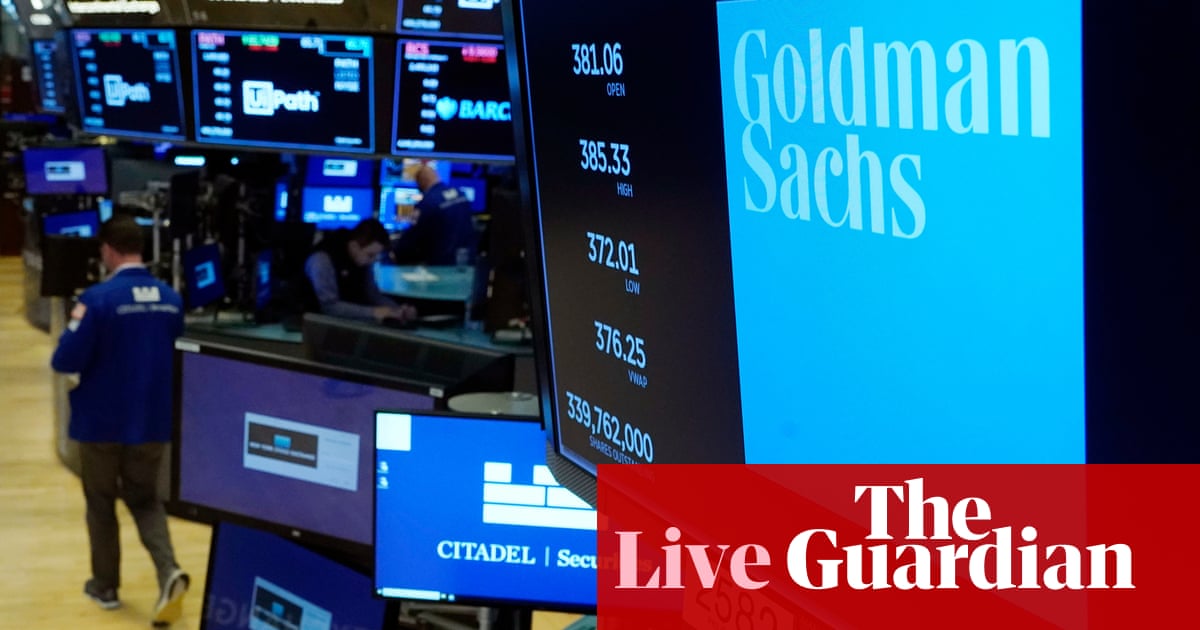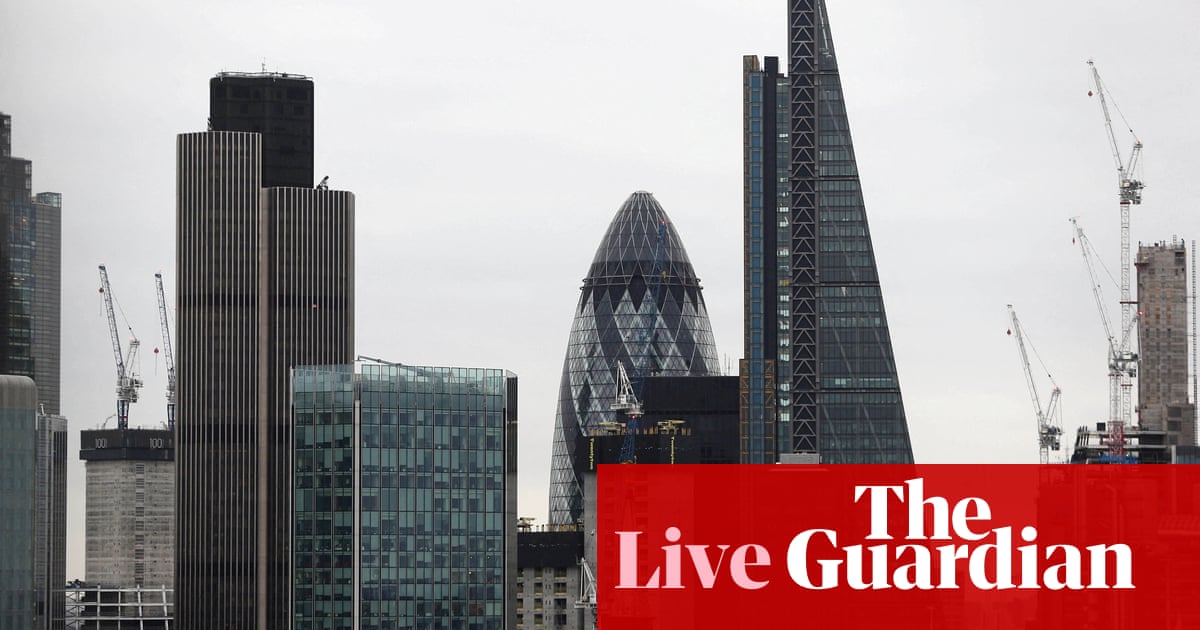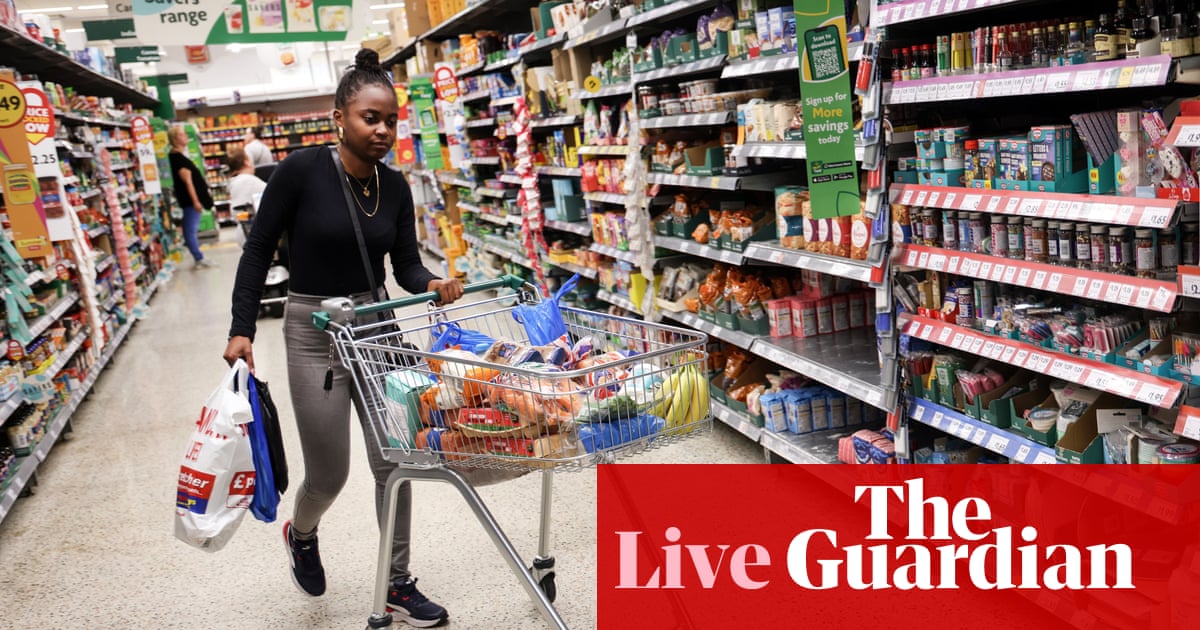
Closing post
Time to recap
UK workers are finally enjoying inflation-beating pay rises, according to the latest official data.
Real regular pay rose by 0.7% per year in June-August, while total pay (including bonuses) was 0.8% higher.
In nominal terms, regular pay growth in the quarter slowed slightly to 7.8% from 7.9% a month earlier, while total pay growth weakened to 8.1% from 8.5%.
The report also showed a fall in payrolled employment, and a drop in vacancies – which economists say may encourage the Bank of England to leave interest rates on hold again in November.
Victoria Scholar, head of investment at interactive investor, explains:
Although today’s figures don’t paint a full picture of the state of the UK labour market, the fall in job vacancies and slight drop in wage growth suggests that signs of slack continue to emerge, highlighting the fragility of the economy as elevated inflation and the Bank of England’s stream of rate hikes take their toll.
With vacancies continuing to decline, businesses are clearly becoming much more cautious about their hiring plans, less willing to take on the fixed costs of full-time staff as a time of economic uncertainty. At the same time, wage growth remains strong by historic standards, something the central bank will be paying close attention to in terms of its fight against inflation.”
It’s also been a day of bad news for job losses, in the UK and beyond.
Rolls-Royce plans to cut up to 2,500 jobs as part of a move to a simpler organisation “that is fit for the future”, according to its new chief executive.
KPMG is cutting around 110 jobs at its UK business amid a slowdown in dealmaking in the City.
UK workers could also be hit by the failure of Swedish electric lorry startup Volta Truck, which filed for bankrupcy protection this morning.
In another blow to UK factories, the Swedish bearings maker SKF has confirmed that it will close its site in Luton, which employs about 300 people.
While in Australia, 1,000 jobs are being cut by Glencore as it shuts its copper-mining plant on Mount Isa.
MPs have heard that the push to roll back hybrid working and force workers back to their office desks is forcing some women to quit jobs in the City.
In the banking sector, Goldman Sachs has reported a 33% drop in earnings in the last quarter.
Shares in chipmaker Nvidia have tumbled almost 5% after the White House announced new restrictions on exporting AI chips to China.
A jump in US retail sales has indicated America’s consumer spending is stronger than expected.
Now this is interesting…. Scotland’s devolved government is planning to issue its first ever bond.
SNP leader Humza Yousaf has revealed that Scotland will raise money on international bond markets for the first time, to fund infrastructure spending.
Yousaf, who became leader of the pro-independence party in March, says the move would help demonstrate the country’s credibility.
Cue some predictable puns:
It’s an fascinating issue, though. In 2015, before the most recent independence referendum, the question of who would own Britain’s national debt, if Scotland left the UK, came up.
The UK Treasury concluded that the continuing UK Government would in all circumstances honour the contractual terms of the debt issued by the UK Government.
An independent Scottish state would become responsible for a fair and proportionate share of the UK’s current liabilities – so would need to issue new debt to meet that obligation.
Closing post
Time to recap
UK workers are finally enjoying inflation-beating pay rises, according to the latest official data.
Real regular pay rose by 0.7% per year in June-August, while total pay (including bonuses) was 0.8% higher.
In nominal terms, regular pay growth in the quarter slowed slightly to 7.8% from 7.9% a month earlier, while total pay growth weakened to 8.1% from 8.5%.
The report also showed a fall in payrolled employment, and a drop in vacancies – which economists say may encourage the Bank of England to leave interest rates on hold again in November.
Victoria Scholar, head of investment at interactive investor, explains:
Although today’s figures don’t paint a full picture of the state of the UK labour market, the fall in job vacancies and slight drop in wage growth suggests that signs of slack continue to emerge, highlighting the fragility of the economy as elevated inflation and the Bank of England’s stream of rate hikes take their toll.
With vacancies continuing to decline, businesses are clearly becoming much more cautious about their hiring plans, less willing to take on the fixed costs of full-time staff as a time of economic uncertainty. At the same time, wage growth remains strong by historic standards, something the central bank will be paying close attention to in terms of its fight against inflation.”
It’s also been a day of bad news for job losses, in the UK and beyond.
Rolls-Royce plans to cut up to 2,500 jobs as part of a move to a simpler organisation “that is fit for the future”, according to its new chief executive.
KPMG is cutting around 110 jobs at its UK business amid a slowdown in dealmaking in the City.
UK workers could also be hit by the failure of Swedish electric lorry startup Volta Truck, which filed for bankrupcy protection this morning.
In another blow to UK factories, the Swedish bearings maker SKF has confirmed that it will close its site in Luton, which employs about 300 people.
While in Australia, 1,000 jobs are being cut by Glencore as it shuts its copper-mining plant on Mount Isa.
MPs have heard that the push to roll back hybrid working and force workers back to their office desks is forcing some women to quit jobs in the City.
In the banking sector, Goldman Sachs has reported a 33% drop in earnings in the last quarter.
Shares in chipmaker Nvidia have tumbled almost 5% after the White House announced new restrictions on exporting AI chips to China.
A jump in US retail sales has indicated America’s consumer spending is stronger than expected.
UK unions are concerned by Rolls-Royce’s plan to cut at least 2,000 jobs.
Following the announcement to the City this morning, Unite general secretary Sharon Graham says:
“Rolls Royce has provided no justification why it believes these job losses are necessary.
“This announcement appears to be about appeasing the markets and its shareholders while ignoring its workers. Attempting to bypass unions will not be allowed.
“This approach only serves to create more stress and uncertainty and Unite will be seeking reassurances on jobs.”
Shares in Goldman Sachs have dropped 1.75% in early New York trading, after its results earlier today.
Fawad Razaqzada, market analyst at City Index and FOREX.com, says:
Following last week’s better-than-expected results from US banks, we saw shares of Bank of America advanced around 1% in premarket after its net interest income came in ahead of estimates.
Goldman Sachs’ profit was hit by a write-down on its GreenSky fintech business and its investments in real estate, causing its shares to slip slightly.
Morgan Stanley is set to report its earnings on Wednesday
Wall Street has opened in the red.
Stocks are being hit by September’s stronger-than-expected US retail sales and the clampdown on AI chip sales to China.
The Dow Jones industrial average has dipped by 0.2%, or 68 points, to 33,916 points.
The tech-focused Nasdaq Composite, though, is down 0.85% or 114 points at 13,454.
Nvdia’s shares are down over 5.5%, after the White House decided to restricting the sale of its chips to the Chinese market.
US clamps down on AI chips to China
The Biden administration has announced a clampdown on shipments of semiconductors used in artificial intelligence systems to China.
The White House says it plans to halt shipments to China of more advanced artificial intelligence chips designed by Nvidia and others.
The move is part of a suite of measures aimed at stopping Beijing from getting cutting-edge U.S. technologies to strengthen its military.
Reuters explains:
The rules, described by senior administration officials in a press briefing on Monday evening, restrict a broader swathe of advanced chips and chipmaking tools to a greater number of countries including Iran and Russia, and blacklist Chinese chip designers Moore Thread and Biren.
The new measures aim to hamper China’s military development by closing loopholes in regulations released last October and will probably be updated “at least annually,” according to Commerce Department Secretary Gina Raimondo.
The goal is to limit China’s access to “advanced semiconductors that could fuel breakthroughs in artificial intelligence and sophisticated computers that are critical to (Chinese) military applications,” she said, stressing the administration was not seeking to hurt Beijing economically.
US government bond yields jumped after the strong retail sales report, as traders anticipate that inflationary pressures could remain high, leading to further interest rate increases….
US retail sales stronger than expected
Some rather strong US retail sales figures have reignited concerns that America’s central bank could raise interest rates again before the year is over.
US retail sales increased by 0.7% month-on-month in September, more than twice the 0.3% rise expected.
On an annual basis, retail sales were 3.8% higher.
Sales were lifted by a 9.2% year-on-year increase in spending at restaurants and bars, while spending on motor vehicles and parts was up 6.2%.
Retail sales are mostly goods and are not adjusted for inflation – so increased prices leads to a rise in sales (unless people buy less stuff).
Greta Thunberg arrested at London oil summit protest
Back in London, Greta Thunberg has been arrested after joining hundreds of protesters who gathered at a five-star hotel in London on Tuesday morning to denounce a meeting branded “the Oscars of oil” (see earlier post).
Footage showed the Swedish climate activist being bundled into the back of a van by police after taking part in protests blocking the entrances of the InterContinental Park Lane, the venue for the Energy Intelligence Forum (EIF), which brings together fossil fuel executives and government ministers.
Critics have called the event the “oily money conference”, in a nod to its previous name, the Oil & Money Conference.
Addressing journalists before joining the protest, Thunberg said:
“Behind these closed doors at the oil and money conference, spineless politicians are making deals and compromises with lobbyists from destructive industries, the fossil fuel industry.
Over in Canada, inflation has slowed to 3.8% on a year-over-year basis in September, down from 4.0% in August.
That’s slightly faster than in the US, where inflation was 3.7% last month, but lower than the eurozone’s 4.3%.
Statistics Canada reports that food inflation slowed to 5.8% per year, from 6.9% in August, due to a slowdown in price rises for meat, dairy products, and coffee and tea.
Tesco has kicked off the process of potentially selling its banking arm, Bloomberg reports.
Citing “people familiar with the matter”, they say:
The grocer has appointed Goldman Sachs Group Inc. as its adviser and begun to reach out to potential buyers, the people said, who asked not to be identified discussing a private matter.
The undertaking is at an early stage, the people said.
Tesco Bank sells credit cards, personal loans and insurance products. Towards the end of 2021 it closed all of its customers’ current accounts, having stopped letting people open new current accounts in 2019.
Vodafone and Three warn of job cuts if proposed UK merger is blocked
Vodafone and Three will be forced to make major job cuts if a proposed merger of their British businesses is blocked, as they increasingly struggle to compete with market leaders BT and Virgin Media O2, top executives from the mobile companies told a committee of MPs on Tuesday.
In June, Vodafone and Three, the UK’s third and fourth-biggest operators respectively, agreed a deal to merge to create the UK’s biggest mobile company with more than 27 million subscribers.
The companies have argued that the merger is essential as they lack the financial resources to invest in their networks and make a viable commercial return, with rivals EE, owned by BT, and Virgin Media O2, dominating the market.
Nicki Lyons, corporate affairs and sustainability director at Vodafone UK, said that while there would inevitably be job cuts across both companies if the deal is cleared by regulators, such as at head office level, there would be much greater cuts if it is blocked.
“The biggest risk is the failure of each company,” said Lyons, speaking to the business and trade select committee of MPs.
“We are falling behind. We are struggling to compete with the two much bigger scaled companies. If we end up failing consumers will have less competition, less options to choose from, and our employees will no longer be employed by us. It is a significant risk if the deal doesn’t go ahead the [mobile] network sector will look dramatically different in the future. It is hard to say when but that is a definite risk.”
In May, Vodafone announced 11,000 job cuts from its global workforce over the next three years, the largest in its history, and the troubled telecom’s group has sold or is exploring the sale of assets in a number of markets around the world.
“Unless [Vodafone Group] can transform the fortunes of Vodafone UK it would ultimately start to question its strategic ownership,” said Karen Egan, head of mobile at Enders Analysis, one of a number of experts that gave their views to MPs.
Stephen Lerner, general counsel and regulatory affairs director at Three, said the company hasn’t grown in five years and is operating at an “unsustainable investment level”.
“Absent this merger we don’t see any real ability to move forward and grow the business that is going to break that cycle,” he said. “The current industry trend is job losses, not gains. The long term outlook for jobs in our companies if the merger doesn’t go ahead is not good. We are subscale and can’t afford to invest. Without this merger things are not looking great.”
Lerner re-iterated that Vodafone and Three have pledged an £11bn investment in next generation standalone 5G infrastructure over the next decade.
However, critics including Tommaso Valletti, professor of economics at Imperial College London, and George Stevenson, bargaining and investigative researcher at union Unite, argued that evidence from other countries shows that reducing competition from four to three major mobile operators results in consumers’ bills going up by 16% to 20%.
“The scientific evidence is uni-directional,” said Valletti, former chief competition economist at the European Commission. “The merger is an exit, it is not the entry of a player in the market.”
Three’s Lerner said that price rises outside of standard annual increases relating to inflation would mean the joint venture would not be competitive with BT and VMO2.
“There are no merger related price rises in the joint business plan, it is not part of the transaction rationale,” he said. “It is not in the interests of the merged entity to increase prices. If we don’t price competitively we will struggle to compete.”
Goldman Sachs profits fall by a third
Just in: Goldman Sachs has reported that net earnings fell by a third, year-on-year, in the last quarter.
Goldman posted net earnings of $2.058bn for the three months to the end of September, down from $3.069bn in the same quarter a year ago.
Revenues from commissions and fees dropped 11%, while investment banking revenues rose 1%.
Net revenues in Asset & Wealth Management were 20% lower than a year ago, due to net losses in equity investments.
But operating expenses rose by 18%, including a 16% jump in compensation and benefits paid to staff.
The quarterly results also included a $506m writedown related to GreenSky, the home improvement lender which Goldman sold last week.
Goldman CEO David Solomon (who has stopped DJing at high-profile events following claims it was a distraction) says:
“We continue to make significant progress executing on our strategic priorities and we’re confident that the work we’re doing now provides us a much stronger platform for 2024. I also expect a continued recovery in both capital markets and strategic activity if conditions remain conducive.
As the leader in M&A advisory and equity underwriting, a resurgence in activity will undoubtedly be a tailwind for Goldman Sachs.
Protest group Oily Money Out have been holding a demonstration in London against the fossil fuel industry.
They have protested outside the InterContinental hotel on Park Lane, where the three-day Energy Intelligence Forum began this morning.
Environmental campaigner Greta Thunberg was anong the protesters, as are Extinction Rebellion.
Two Greenpeace activists scaled the five-star Intercontinental Hotel in Mayfair and unfurled a giant banner over its entrance reading ‘Make Big Oil Pay’.
Maja Darlington, campaigner at Greenpeace UK, says:
“Oil bosses are toasting each other in a luxury hotel and plotting how to make even larger profits, while millions struggle to rebuild after a summer of extreme weather. Big oil is profiting from humanity’s loss and those who have done the least to cause climate change are being forced to pay the price.
“People are sick of watching their energy bills rise and the injustice of floods and wildfires around the world while their elected officials rub shoulders with oil bosses in Mayfair. Letting oil companies like Shell decide our planet’s future is like putting an arsonist in charge of a fire station. It’s time to get their oily influence out of our politics and make Big Oil pay for the millions losing lives and livelihoods because of this industry’s ruthless pursuit of profit.”
Britain’s competition watchdog is investigating boiler maker Worcester Bosch over concerns that it is misleading shoppers with its “hydrogen-blend” boilers.
The Competition and Markets Authority (CMA) will examine if customers are being told confusing or inaccurate green claims.
The CMA is concerned that the marketing of these ‘hydrogen-blend’ boilers, could mislead people into thinking they are more environmentally friendly than they are.
Its investigation will examine:
Labels or text stating that Worcester Bosch’s boilers can run on a blend of 20% hydrogen and natural gas, which may give the impression this is a special feature despite all boilers in the UK being legally required to operate this way since the mid-1990s.
Information and messaging on the use of hydrogen for home heating in the UK – despite this not currently being available and its introduction being potentially years away and dependent on future government decisions.
Descriptions and information about the environmental benefits of ‘hydrogen-blend ready’ boilers which may falsely suggest that these boilers will reduce a household’s carbon footprint.
Last month, Sky News reported that several companies are making confusing and potentially misleading claims about hydrogen, as part of the sales process for standard gas boilers.
The UK government is currently consulting about whether to blend of up to 20% hydrogen by volume into the gas distribution networks. But it’s not clear when, if ever, hydrogen will replace natural gas to power boilers.
George Lusty, senior director for Consumer Protection at the CMA, said:
Businesses need to be clear about the environmental credentials of the products they’re selling. This is especially important for heating products like home boilers, which are an expensive and long-term purchase.
We set out our concerns earlier this year about businesses marketing boilers as ‘hydrogen-blend’. We’ll now be scrutinising green claims from Worcester Bosch to see if they mislead shoppers.
In the meantime, we’ll continue to keep a close eye on practices in the sector.
Glencore "to cut 1,000 jobs and chut Mount Isa copper mines"
Over in Australia, mining giant Glencore is reportedly planning to cut 1,000 jobs.
Glencore is planning to close its copper mining operations in Mount Isa, Queensland, by the end of 2025, according to the Australian Financial Review.
The AFR says:
With global miners struggling to contain costs and boost profitability amid increasing economic uncertainty, Glencore on Tuesday will announce its three underground copper mines in Mt Isa will be closed by the second half of 2025.
It is understood the mines are reaching the end of their natural life and the copper grade had become much lower which forced the decision.
But in a bid to allay local concerns, Glencore will confirm it will keep its copper smelter in Mt Isa and refinery in Townsville open, with enough third-party work to keep them profitable.
More here: Glencore to shed 1000 jobs and shut Mount Isa copper mines by 2025
Rollback of hybrid working "driving women out of City", MPs hear
The rollback of hybrid working patterns is forcing women out of the City of London, MPs have been warned this morning.
The Treasury Committee is holding a hearing into sexism in the City, and asks whether things have improved over the last five years.
Fiona Mackenzie, CEO of thinktank The Other Half, tells MPs that the “accidental” introduction of hybrid working in the financial sector due to the Covid-19 pandemic did lead to some “fantastic progress”.
She says:
That has had a huge impact on working parents, [and brought] huge benefits for working parents, particularly for women – whether they or their partner are hybrid-working.
I think that has been life-changing.
There are lots of women in the City who are doing roles they would not be able to fulfill before, Mackenzie says, because they can be home-based sometimes, and due to the flexibility over when and where they work.
That is a huge thing if you have children, it makes such a difference to your ability to work.
Mackenzie warns, though, that very few people defend hybrid working – many CEOs don’t love it, and are quite keen to switch it off even though their staff love it.
So “lots” of hybrid working is being dialled back, particularly in founder-led firms, US-based firms and the investment industry.
This is forcing many high-performing women out of their jobs, Mackenzie warns:
There are women all over the City who are now working their notice, who have left jobs where they were high-calibre performers, because hybrid working enabled them to stick in those roles.
And there are leaders who are tearing their hair out, because they know they are losing great people because of these decisions to just switch off hybrid working unthinkingly.












